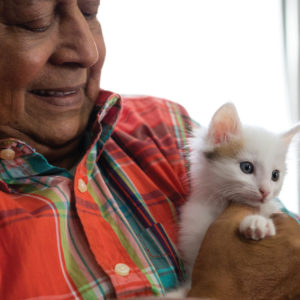
What is TheraTails
TheraTails is a unique form of transdisciplinary animal-assisted psychotherapy. We hold weekly sessions at the SPCA and within the community for individuals, families, and groups. Thanks to our private and corporate donors we have been able to directly and demonstrably improve the lives of children, young people, families, and animals here in Bermuda.
Why animal-assisted psychotherapy
All of us have seen how this modality can reach the people who need therapy most, in a way that other interventions cannot. We felt compelled to share such a valuable therapeutic tool and we began working together in 2019, designing and delivering the only rigorous evidence-based animal-assisted psychotherapy programme in Bermuda. We believe that compassionate and creative help should be available to all beings who do not fit into traditional healing pathways.
What makes us different
This is NOT simply incorporating animals for wellbeing. This is a highly specialist, clinically driven intervention that uses expertise from psychodynamic theories, forensic psychology, multisystemic child and adolescent work, and behavioural traditions to create a unique therapeutic experience tailored to individual needs. The team comprises a Clinical Psychologist, an Equine Specialist, and a Canine Training and Behavioural Specialist. Each session is built around a single animal or a group of animals.
Sessions are intensive and involve constant change, containment, processing and reflection. Our work does not stop with sessions. We undergo specialist supervision to refine our practice and help us manage the powerful and challenging material that clients bring.
We do not work with the client in isolation. Typically, we slot into the picture as part of a wider care team, capturing a distinctive and unusual side of the client, and able to make clinical recommendations based on the client/animal interactions we observe.
This is a therapy that demands a great deal of resources: scheduling, financial, emotional. Yet it is often the only viable option. Our program has been mandated several times by both Family and Criminal Courts because it has been recognised as the sole source of safety or risk reduction in chaotic lives. And for those clients resisting court-mandated therapy, partnering with animals increases engagement. Without this program our clients would either not receive therapy or would attend under duress, defeating the purpose of the original mandate.
Two Issues
- Disorders that cannot be treated by talking therapies require a live, dynamic and symbolic approach.
- Neglected and abused shelter animals need live encounters, human contact, and attention in the service of socialization and eventual adoption.
Clients are better able to understand and manage themselves socially and emotionally because of our work, and animals learn to trust humans, delight in their achievements, and find loving homes.
We offer these clinically-driven services free of charge to the whole community. TheraTails is especially targeted at those who may not be able to manage traditional therapy for social, emotional, financial or systemic reasons.
We work with the SPCA because animals and people have a great capacity to help and heal each other. To date, the TheraTails team have delivered nearly 300 sessions to 30 diverse clients while helping to socialize and re-home nearly 50 dogs, cats, horses, rabbits, guinea pigs, and one turkey.
Who Can Benefit
The majority of our clients come from disturbed backgrounds and have had adverse childhood experiences. The aftermath of trauma often coexists with communication difficulties. Clients typically have difficulty symbolizing their disorder. This could be because they are nonverbal; they are neurodiverse; they have a developmental disorder; or they have intellectual disabilities or severely disordered attachments that profoundly affect their ability to trust and relate. This could also be because their problems are inaccessible to conventional therapy. Many psychological issues are held within the body and need a holistic approach. This is particularly the case with transgenerational trauma.
Referral and Recovery Pathways
Clients are referred from a wide variety of sources. Each new referral receives an assessment and triage session with our Clinical Psychologist. We allocate them to either canine or equine psychotherapy, depending on their own capacities and preferences. We speak with clients and caregivers about individual goals and design evidence-based sessions around specific needs.
Sessions take place weekly and continue for as long as the clients require the service, or are able to attend. One key benefit to this type of work is client adherence to the therapy; the sessions are outdoors and focused on animals rather than issues. There is no need to talk, or answer questions. As such, sessions foster an immediate sense of pleasure and achievement. We are able to engage certain clients and families that have previously been non-compliant with all forms of professional intervention.
Once clients are engaged and working with us, we actively seek to involve them in outreach and dissemination of ideas. They are able to see the impact they have had upon the animals they work with and also see the benefit to themselves. Clients, families, and caregivers work with us to pass on the message to others who may need similar interventions.
Collaboration
So far, we have been very pleased to work with self-referred clients; government bodies such as The Department of Child and Family Services and the Department of Court Services; King Edward Memorial Hospital and Mid-Atlantic Wellness Institute Child and Adolescent Services; schools, residential homes, pediatricians and other medical professionals. We have also begun discussions with early years initiatives and third-sector organizations and we hope to work in tandem with other charitable care providers soon.
What Do We Actually Offer
Equine-Assisted Psychotherapy
Run by Kate Terceira and Dr Laura Henagulph, who are trained and certified in the Eagala Model. This type of therapy uses psychodynamic theory to interpret the interactions between the horse and the client. We first allow the client/s to get to know the horse and experience grooming and caring for the animal. We then set simple exercises that require reflection and communication between human and animal. This creates a quiet, undemanding therapeutic space. The client is welcome to speak or to remain silent. Usually, we see strong themes appear fairly quickly and continue from week to week. We are then able to offer our thoughts to the client for discussion afterwards.
This type of therapy takes 45 minutes. It can be done individually or in small groups (the therapy is useful for families). The therapy session takes place either on site in the SPCA stable with private paddock or at a private stable off site.
Animal-Assisted Mentalisation-Based Therapy
Run by Eileen Thorne and Dr Laura Henagulph. The overarching task of the sessions is to help socialise the animals. We can do this slowly and incrementally, or more actively, through clicker training. Mentalisation-based Therapy (MBT) is a type of therapy focused on what is happening in the present. We seek to make thoughts, feelings and intentions clear and explicit. We do this by talking with the client about the interactions taking place and thinking about the assumptions and misinterpretations that may be happening. For instance, a client may be puzzled by an animal’s sudden withdrawal; we then discuss in detail what was happening at the time and what might have been going on in the animal’s mind. This helps with perspective-taking and lowers impulsive reactions in social situations.
This type of therapy takes one hour. It can be done individually or in small groups. The therapy can take place on site with a range of animals to interact with; or we can visit your home or facility with a therapy animal, usually a small dog. This type of therapy can also function as an extended assessment: children, adolescents and adults who work particularly well with the animals can be referred on for more intensive individual work.
Funding & Sustainability
Our central precept is that the therapy should be free for all. However, it is a therapeutic modality that requires a lot of resources. We strive to keep our costs as low as possible: our funds are principally spent on paying our therapists, both human and animal. For instance, if we work with the dogs that day, a percentage of the session fee will go towards their upkeep. One-third of our client population is now drawn from those who have insurance; this means our funding lasts longer and we can afford to continue therapeutic care for those most in need.
However, to meet the fast-growing need for our services, the TheraTails team are devoting more and more working hours to the venture: we are taking on more and more complex clients that require a higher level of case management and further systems of support. TheraTails aims to be a full-time therapy programme offering 15 sessions per week and we are therefore actively seeking funding and sponsorship.
For further information, please email us at: info@spca.bm
Sponsored By:
TheraTails News
- TheraTails: Animals for therapy right here, right now
 Shelters all over the world have seen a rise in animal adoptions during the COVID-19 pandemic. Why? This article outlines some of the reasons: emotional support, the need for touch and the desire to care for another creature. All of these are especially valuable when we’re in isolation. Interacting with an animal can help with anxiety, lowering your heart rate, blood pressure and cortisol levels while increasing your feel-good dopamine.
Shelters all over the world have seen a rise in animal adoptions during the COVID-19 pandemic. Why? This article outlines some of the reasons: emotional support, the need for touch and the desire to care for another creature. All of these are especially valuable when we’re in isolation. Interacting with an animal can help with anxiety, lowering your heart rate, blood pressure and cortisol levels while increasing your feel-good dopamine. - Transforming Therapy through Horses: Reflections on the Eagala 20/20 Conference
 Watching sessions in the arena, I was struck by the tremendous energy, both physical and emotional, that was unleashed. At first, I did not really grasp what was happening. There was a lot of movement among the horses, some gentle commentary and suddenly the volunteer ‘clients’ were talking… Read more: Transforming Therapy through Horses: Reflections on the Eagala 20/20 Conference
Watching sessions in the arena, I was struck by the tremendous energy, both physical and emotional, that was unleashed. At first, I did not really grasp what was happening. There was a lot of movement among the horses, some gentle commentary and suddenly the volunteer ‘clients’ were talking… Read more: Transforming Therapy through Horses: Reflections on the Eagala 20/20 Conference
